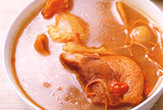Excellent translators are desperately needed if China wants to promote its culture abroad. Though we boast so many excellent writers, we have few good translators these days.
This idea was shared by many Chinese writers when they were discussing how to best share Chinese literature with the rest of the world at the 17th Beijing International Book Fair, held from August 30 to September 3.
 |
Qualified translators and interpreters are in demand in China. |
Grabbing a share for the Chinese writers in foreign mainstream markets is a top priority today. By one rough estimate, more than 1,000 contemporary literary works (mainly novels) have been translated into foreign languages and distributed overseas since the Reform-and-Opening-Up of 1979, allowing 230 Chinese writers to expand their readership on the world scene.
But this pales in comparison to the huge number of books published every year in total within China. This embarrassing fact has raised a red flag that demands our attention.
Liu Qingbang, author of Shenmu, a well-claimed book that has been adapted to the award-winning movie Blind Shaft, said that the masterpiece A Dream of Red Mansions, when translated into a foreign language, inevitably loses something of its Chinese flavor.
Professional translators appeared in China as early as 2,000 years ago, and literary translation had started by the time Buddhist literature was introduced to China in the Eastern Han Dynasty (25-220). Since China in ancient times was a powerful and prosperous country, many foreign countries rushed to learn its politics, culture and economic management. These foreigners, by accident or by design, began to take on the daunting job of translating and disseminating Chinese culture for other parts of the world.





Why not rent a boyfriend, or girlfriend to please parents during the Spring Festival?